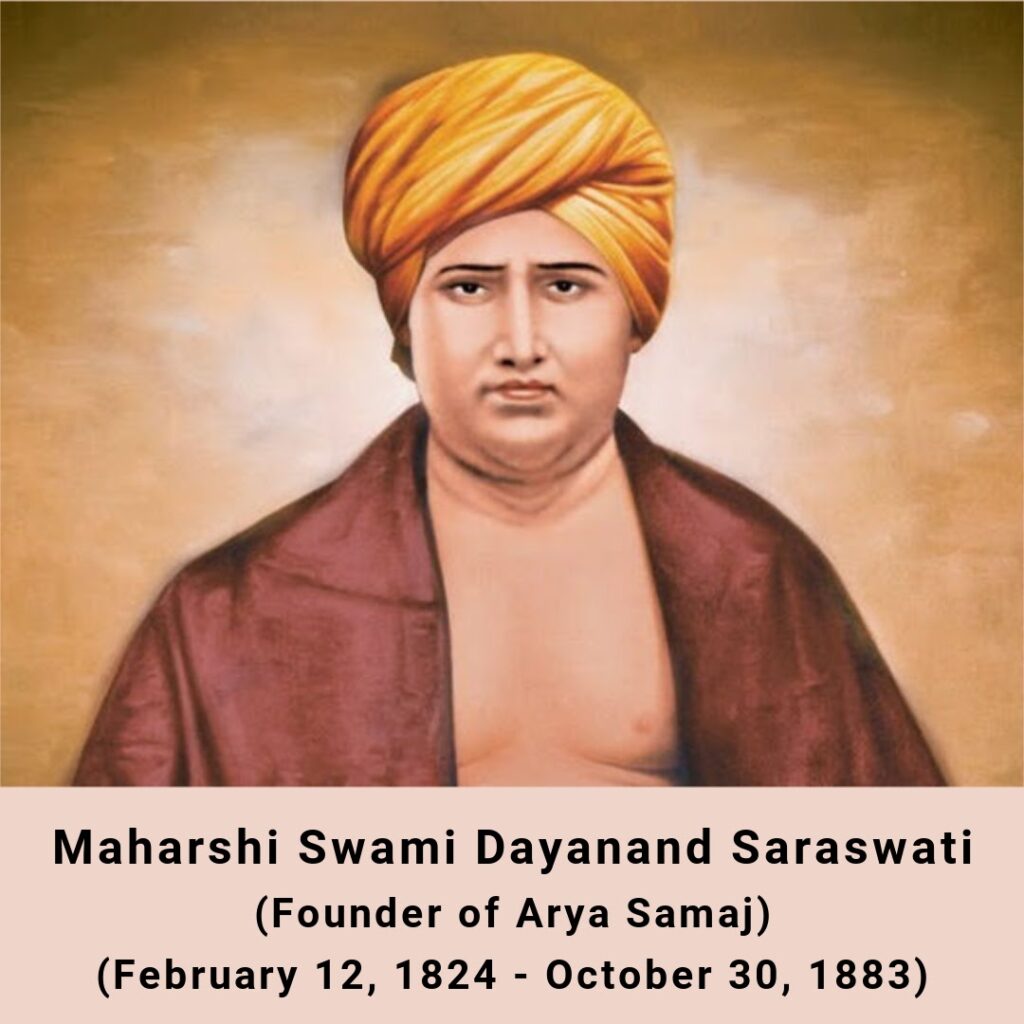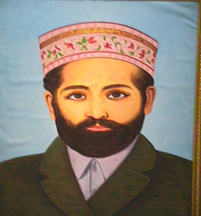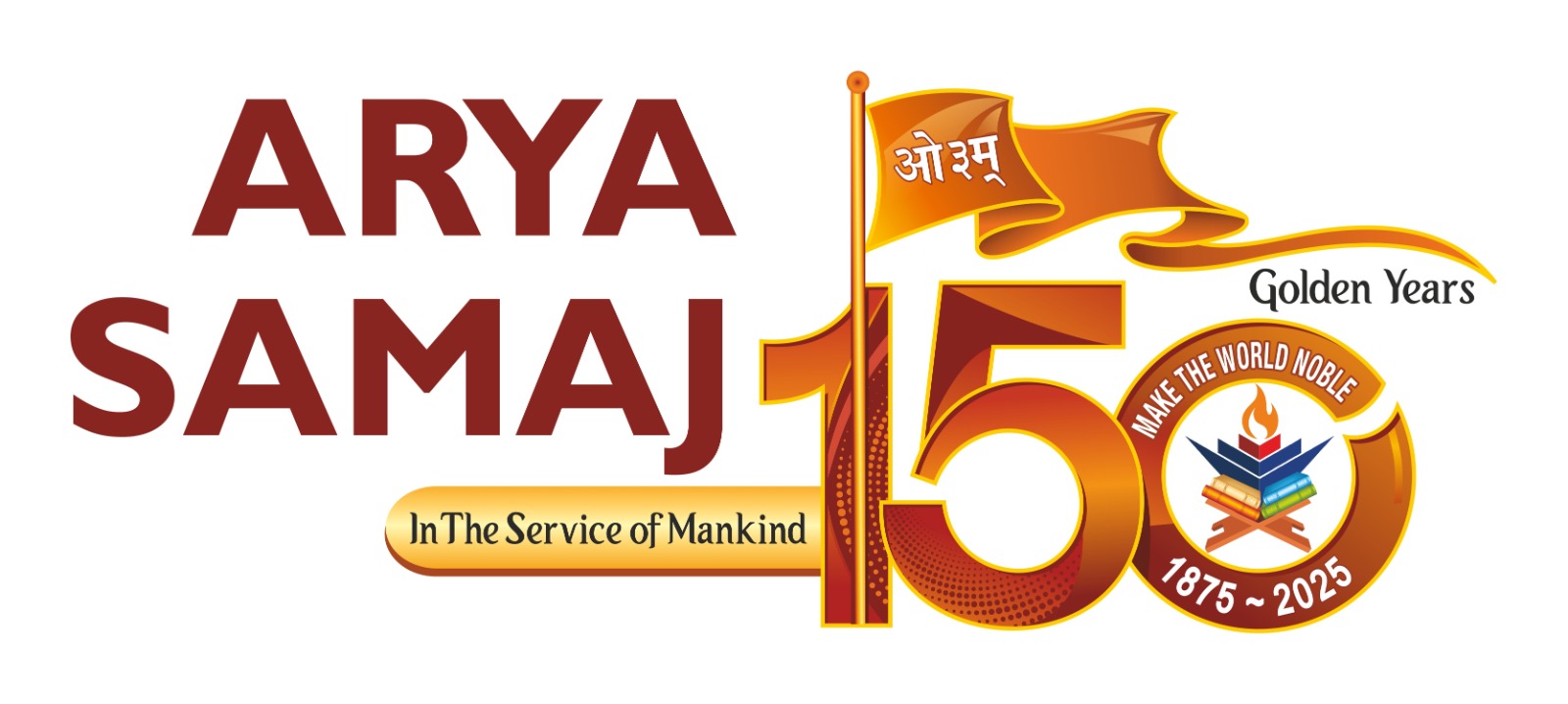Maharshi Swami Dayanand Saraswati (1824-1883)

“Back to the Vedas”. This was the clarion call of Swami Dayanand Saraswati, religious leader, social reformer, gifted speaker and prolific writer. In 1875, Swamiji founded the now global fellowship of the Arya Samaj. His writings include commentaries on the Rig, Yajur and Sama Vedas, an encyclopedic work on Hinduism called Satyarth Prakash, a book of prayers and a work on Sanskrit grammar. Swami rejected idol worship and polytheism. He fought against superstitions, child-marriage, the hereditary caste system and forced widowhood. He advocated women’s education, cow protection, a single national language – Hindi and the study of Sanskrit. He made it clear that politics – Danda Niti – was an essential part of the national life of the people who must work for self rule – Swarajya.
Born in 1824 in Tankara Kathiawar (now in Rajkot district of Gujarat), Mool Shankar, (the original name of Swami Dayanand) was born in a Shaivite family. At the age of 14 while fasting on the night of Shivratri in the temple he was startled when he saw a rat climbing the Shivling and eating the offerings. It created doubts in his inquisitive mind about the real Eeshwar (God) and the yearning for true knowledge seized him. The sudden death of his sister and uncle also had a tremendous impact on him in his quest for truth. He left his father’s home at the age of 21. He wandered the country for 20 years and learned the Vedas from scholars. His Guru, Swami Virjanand of Mathura, the blind saint with a giant intellect, gave him his mission. Swamiji died at Ajmer on October 30, 1883, having been poisoned.
Maharshi Swami Dayanand, founder of the Arya Samaj was one of the very few great-enlightened men of the world who sacrificed everything for the emancipation of mankind. He was a great scholar, a yogi, a philosopher, a social reformer, a great orator and a foremost political thinker. Born in affluence and luxury, he left home when forced by his parents to get married and he wandered in the Himalayas in pursuit of knowledge and truth. Facing hardships, difficulties and resisting all temptations, he studied the ancient scriptures, particularly the Vedas which he regarded as a source of Divine knowledge and engaged himself in the Herculean task of spreading that knowledge. Swami Ji believed that Dharma is the following of truth which alone triumphs ultimately, and secures “Dharma, Artha, Kama and Moksha” for all devotees. Maharshi Swami Dayanand said “The man who resolves to stick to truth at all costs, steadily rises in virtue. When his virtues raise his reputation and prestige, he becomes even more a devotee of Truth. This devotion to truth becomes an unerring source of power and greatness”
Truth, according to him, was not only conformity in word thought and action “but also propriety of ideas in connection with real matters”. In his Satyarth Prakash (Light Of Truth) Swami Ji lays down certain criteria to judge what truth is. These criteria include whether the subject was in conformity with the teachings of the Vedas, nature, attributes and characteristics of Eeshwar; whether it was in harmony with the practice and teaching of the Aaptas, the pious, truthful, unprejudiced, honest and learned men. Whether it was in keeping with the purity and conviction of one’s own self or whether it stood the test of direct perception, inference, analogy, testimony, history, deduction, possibility, and negation. It was indeed his love of Truth that drove him to make a comparative study of the religious practices and pass judgements on their merits and demerits. As he himself said, “My sole aim in criticizing the view of others is to arrive at the truth”. There was no bitterness in his heart, no malice even for his critics. On the other hand his heart was so full of love and sympathy for all that he pardoned the man who poisoned him to death. He advocated reconversion of converted Muslims and Christians to their original faith. He held many Shastrarth (open debates) with Christian missionaries, Muslim maulvis, and Pauranik pandits all over the country with a view to removing dogmas, superstitions, rituals, idol worshiping and other evil practices then prevailing in Indian society in the name of religion.
At times his defeated opponents tried to assault him. He however, carried on his mission undaunted and without fear. To a well-wisher he once said “it is not man that guards me but the great Lord who protects me everywhere. Don’t be anxious about my account.” Swami Ji maintained that a man’s salvation lies in following the teachings of the Vedas, which he considers the revelation of Eeshwar. The teachings of the Vedas are infallible because Eeshwar who revealed them to the Rishis, is Perfect. Maharshi Dayanand had imbibed in himself the feeling of nationalism and patriotism. The part played by him and his disciples and followers reflects the revolutionary zeal in the blood of Maharshi Dayanand. He had an association with the rulers of the different states. His influence over the Maharajas of the states of Bharatpur, Raipur, Udaipur, Shahpur and Jodhpur is quite well known and adds a lustrous chapter in the history of Arya Samaj and India’s Independence struggle.
As a social reformer, he waged an eternal war against evils like idol worship, untouchability, child marriage, and Sati-Pratha. He preached that having a dip into the sacred water of the Ganges cannot absolve a person of his sins. One has to bear the consequences of one’s sins, as Eeshwar who is just – is not easily beguiled by such rituals. He also attacked the theories of Saakaarvad (incarnations) on the ground that Eeshwar is all supporting and formless. He removed the misconception among the Hindus that shudra and women had no right to study the Vedas. He tried to break all barriers to caste, creed, color and sex which separated man from by propagating the doctrine of the universal brotherhood based on the assumption that Eeshwar is the creator of all.
On the educational level, he strongly advocated women’s education and a return to the Gurukula system of education. Even though his mother tongue was Sanskrit and Gujarati, he switched over to Hindi and advocated its acceptance as the language of India. He maintained that one’s action and not sheer birth determines one’s Varna. He prescribed the duties of each Varna – Brahmin, Kshatriya, Vaishya and Shudra in conformity with the teachings of the scriptures and the Vedas. He also divided a man’s life into four stages and taught the respective duties and obligations of each ashram in addition to formulation of a common code of conduct formally. The four ashrams, according to him, were Brahmacharya, Grihasta, Vanaprastha, and Sannyasa.
Realizing that Indian society’s main drawback is its disunity and division, he gave a call for one Eeshwar – OM, one religion – Vedic Dharma, one language – Hindi, one caste – Arya and one method of worship – Sandhya. To ameliorate a lot of the suffering humanity, he founded an institution which he named as Arya Samaj. ‘Doing good to the whole world’ he said, is the primary object of this society, i.e., to look after its physical, spiritual, and social welfare.” Among the ten principles enunciated by him for the Arya Samaj are: A famous historian, Dr.J.N.Sarkar says “He is a true statesman”, ”who can legislate for the future, who can set a force at work which will go on influencing the lives and thoughts of unborn generations. When the history of India’s growth comes to be written, that high rank will be judged to the ‘naked Fakir’, “Dayanand Saraswati”.
As a nationalist, Maharshi Dayanand was courageous and outspoken. He never feared the mightiest in expressing what he considered to be true and correct. North Brooke, the British Viceroy of India in 1873 wanted appreciation and praise of the British rule and administration in India in the speeches of Maharshi Dayanand Saraswati, Maharshi Dayanand categorically told him that twice daily he prayed to Eeshwar to liberate India from foreign rule and he wanted to see India, fully independent as soon as possible. “One should always be ready to accept the truth and give up untruth”. “One’s dealings should be regulated by love and justice in accordance with the dictates of Dharma”. “One should promote knowledge and dispel ignorance”.
We are introducing to the public the life and teachings of this great Rishi with a hope that it will inspire readers to emulate his example and follow the path of truth. We are sure that following his path, humanity can certainly overcome pain and suffering and enjoy the Divine bliss and happiness which are being sought by everybody. He saw ignorance as the root cause of all miseries. This he thought consisted in regarding impure things as pure, painful things as pleasure giving, mortal things as immortal. Emancipation depended on removal of this ignorance. There is no emancipation as long as ignorance persists. For the first time in history, He asserted and proved that there was no Monism but Trinism in the Vedas. He showed through apt quotations from the scriptures that Eeshwar, soul and matter were different attributes.
Pandit Gurudutta Vidyarthi

A long life is no guarantee of a long public service. If a person is dedicated and devotes his life to the wellbeing of the society then even a short span of time is enough to guarantee the achievement of his objectives. This fact was proven by renowned Vaidik scholar of Arya Samaj, unparalleled orator, Arya Samaj missionary Pandit Gurudutta Vidyarthi.
His life was short, a mere 26 years. But even in this small time the kind of knowledge, writings, organizational success and the promulgation Arya Samaj that he could achieve can be a subject of envy for many centenarians.
Pt. Gurudutta was born on the 26th of April 1864 in Multan, in present day Pakistan. He completed his secondary education there and took admission in a Government College Lahore for higher education in 1881. By this time he had already been a member of Arya Samaj for over a year.
The most notable and profound incident of his life was in 1883 when the news of the illness of Maharshi Dayanand reached Lahore. Pandit Gurudutta Vidayarthi was sent by his Samaj to Ajmer to be in service of Mahrshi Dayanand. He was 19 years of age. The last few days of Swami Dayanand had a course altering impact on his life. He saw how a Mahrshi dedicated to Parameshwar (God) and to the welfare of all beings is fearless of death and is ready to meet Eeshwar. The salvation of Mahrshi Dayanand, his composure, his resolute unwavering faith in Eeshwar had a significant impact on his life.
The Arya Samajists of Lahore decided to set up a DAV (Dayanand Anglo Vaidik) College in Lahore in the memory of Mahrshi Dayanand. Pandit Gurudutta Vidyarthi was in the forefront of this mission. His contribution in collecting funds from different cities is both notable and praiseworthy. To achieve the objective of collecting sufficient funds for the college he went to multiple cities of United Province (modern day Uttar Pradesh ) and Punjab. While Traveling he was busy spreading the message of Arya Samaj and Vaidik Dharma and gave a series of lectures. These lectures were regarded as very scholarly by the audience.
Pandit Gurudutta had a phenomenal command over English and Sanskrit languages. Though he did not get an opportunity to learn Panini Grammar from a teacher he was able to gain command over it through Swadhyaya or self study. He was able to finish most of the basic Sanskrit grammar books while at school. His knowledge of Panini grammar was so extraordinary that various people, much older in age, learnt Panini grammar from him. Chief among them were, Swami Achyutanand, Swami Swatmanand, Swami Mahanand, and Swami Nijatmanand.
He also started printing a bulletin, The regenerator of Aryavart. Here he wrote multiple articles on the essence of Vedas, Vaidik Civilization, the principles of Maharshi Dayanand, the terminology of the Vedas dedicated to Maharshi Dayanand. This article also received a place in the graduate course of Oxford University.
He also did a simple and comprehensive analysis of Upanishads. His commentary of Eesh, Mundak and Mandukya became quite famous. He also provided a scientific analysis of various Vaidik Mantras. He was quite pro active in replying to the various misinterpretations of Vaidik texts by western scholars.
While he was a scholar par excellence, his private life was extremely simple but irregular. He hardly paid any attention to his health. Be it summer or winter he remained indifferent towards his health. His eating habits too were irregular and had very little food, constant travel, writing, social work all had an adverse effect on his health and he suffered from tuberculosis. For a change of scenery he traveled to a hill station but it did not have the desired effect. His body had deteriorated beyond recovery and the doctors could not help him.
Pandit Gurudutta Vidyarthi, the young muni left this earth on 19th March 1890.
